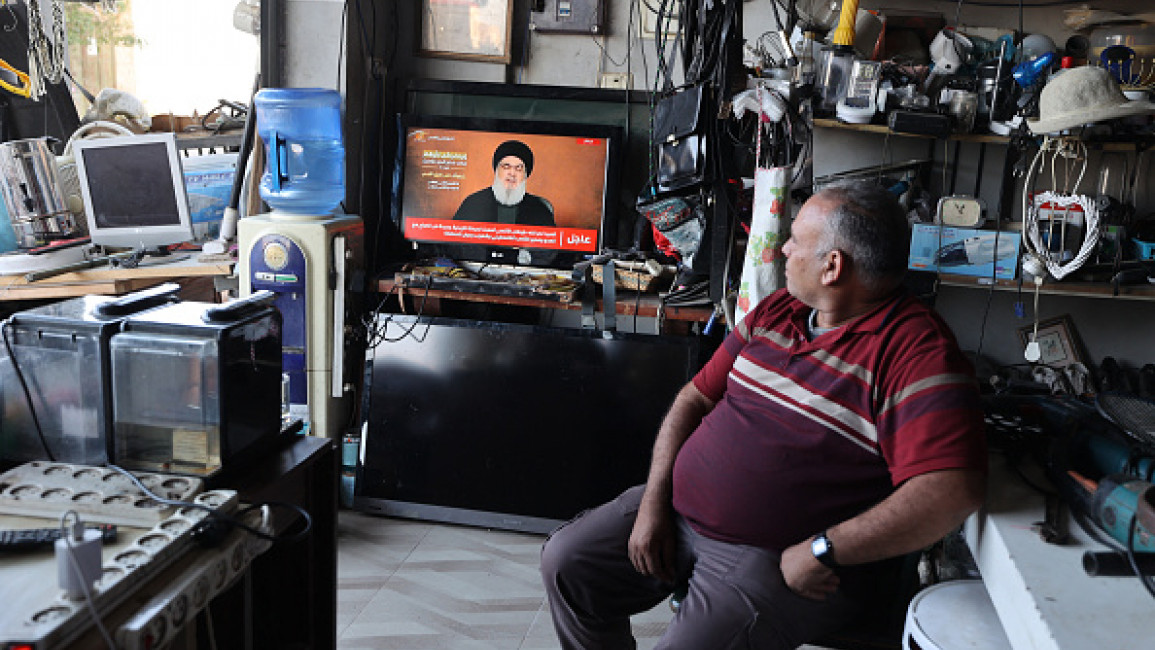Gaza war: Four takeaways from Hezbollah chief Hassan Nasrallah's speech
Lebanon's Hezbollah chief Hassan Nasrallah on Friday broke his silence on Thursday, addressing Israel's war on Gaza following the surprise attack launched by Hamas on 7 October.
Nasrallah's highly anticipated speech was broadcast as part of an event held in Beirut's southern suburbs, a Hezbollah stronghold, at 3pm (1pm GMT) on Friday, in memory of fighters killed in Israeli bombardments.
It followed a teaser campaign throughout the week, with many expecting a significant announcement from the Hezbollah leader on the Gaza war.
In the televised address, Nasrallah hailed the Hamas attacks on Israel on 7 October as a "great success", saying it revealed that Israel was "weaker than a spider's web", but denied any Hezbollah or Iranian involvement in the operation.
The New Arab has put together the four key takeaways from his address.
1. Iran 'not involved' in Operation Al-Aqsa Flood
Nasrallah said that the Hamas operations on 7 October, leaving 1,400 Israelis dead, were planned in total secrecy and that even other Palestinian factions were unaware of it, let alone international actors - i.e. Iran and Hezbollah.
"The great secrecy made this operation greatly successful," he said.
"It was a 100 percent Palestinian operation, planned and executed by Palestinians for the Palestinian cause, it has no relation at all to any international or regional issues."
2. Called for ceasefire, prisoner exchange deal
Nasrallah said that halting attacks on Gaza could prevent a regional war and ridiculed Israel's initial objective of wiping out Hamas.
He called for a prisoner exchange deal with the release of Israeli hostages for Palestinian detainees.
3. Urged regional countries to boycott, suspend trade with Israel
He urged Arab and regional countries to take a tougher stance on Israel, calling for a full economic blockade of the country, including food and oil.
"You must work to stop the Israeli aggression against Gaza - is not enough to denounce," he said. "Rather, sever relations and withdraw the ambassadors."
He added that exports to Israel must be stopped and Arab states should push to fully re-open the Rafah crossing.
4. All options 'on the table' on Lebanon-Israel front but no commitments from Hezbollah
Nasrallah said that all options on the Lebanese front were open, adding that the situation could escalate militarily "at any time" but stepped back from committing Hezbollah to the war.
"The developments on the Lebanese front are dependent on two things: the course of events in Gaza and the enemy's behaviour towards Lebanon," Nasrallah said.
"All options are open on our Lebanese front," he said, adding: "We say to the enemy that might think of attacking Lebanon or carrying out a pre-emptive operation, that this would be the greatest foolishness of its existence."
He highlighted that Hezbollah had already "entered the battle" with the past weeks' unprecedented cross-border attacks, threatening that it "will not be limited to this".
Still, he fell short of announcing a full engagement in the war.



